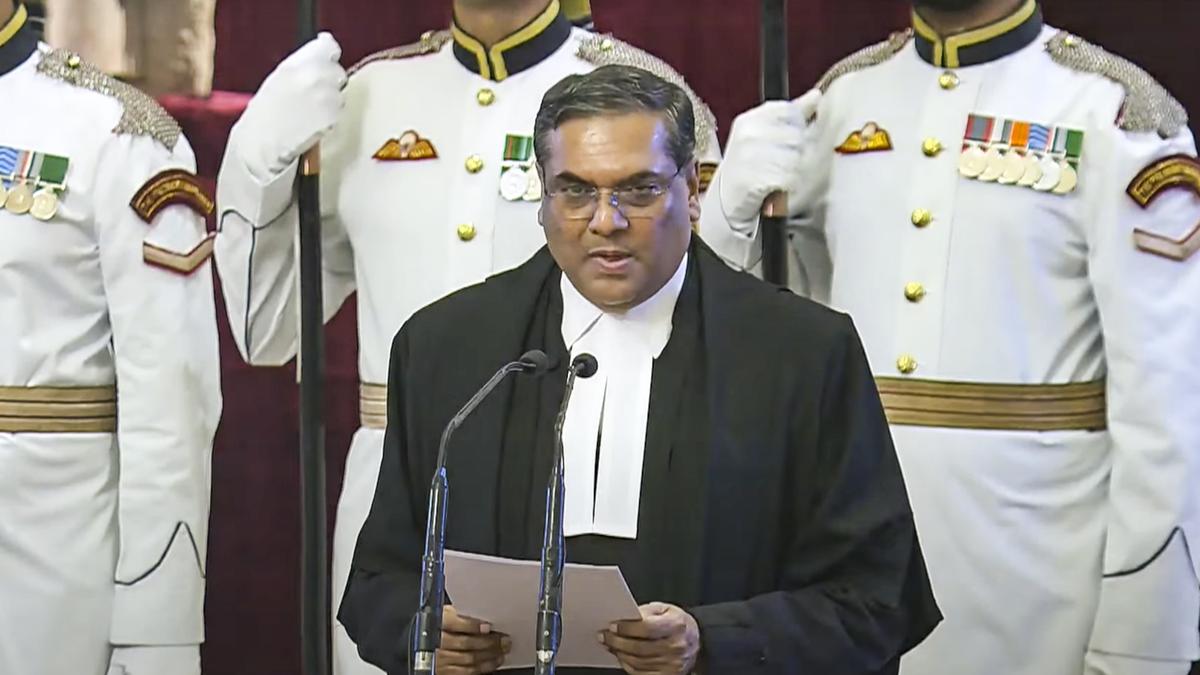Chief Justice of India

- 13 Nov 2024
In News:
On November 11, 2024, Justice Sanjiv Khanna was sworn in as the 51st Chief Justice of India (CJI) at the Rashtrapati Bhavan, New Delhi, marking a significant milestone in the Indian judiciary. He succeeds Justice D.Y. Chandrachud, who retired on November 10, 2024. Justice Khanna's term as CJI will last until May 13, 2025.
Background of Justice Sanjiv Khanna
Early Life and Legal Career
- Legal Practice: Justice Khanna began his legal career in 1983 after completing his law degree from Delhi University. He practiced in the District Courts of Delhi and handled cases in constitutional law, taxation, arbitration, and environmental law.
- Career in Delhi High Court: He was appointed as an Additional Judge to the Delhi High Court in 2005 and became a Permanent Judge in 2006.
- Appointment to the Supreme Court: Justice Khanna was appointed as a Supreme Court Judge in January 2019, without having served as a Chief Justice of a State High Court, and superseding 32 senior High Court judges.
Key Judicial Rulings of Justice Sanjiv Khanna
Major Constitutional Bench Decisions
- Abrogation of Article 370: Justice Khanna was part of the Bench that upheld the abrogation of Article 370 of the Constitution, which revoked Jammu and Kashmir’s special status.
- Electoral Bonds Scheme: He also contributed to the ruling that struck down the 2018 Electoral Bonds scheme, raising questions about the transparency of political funding.
Support for EVMs
- Justice Khanna defended the use of Electronic Voting Machines (EVMs) and rejected calls to revert to paper ballots, emphasizing the need for technological progress and institutional trust.
Personal Liberty and Bail Decisions
- Arvind Kejriwal’s Interim Bail: Justice Khanna granted interim bail to Delhi Chief Minister Arvind Kejriwal in the liquor policy case, underscoring personal liberty as a fundamental right.
- Judicial Review of Bail Conditions: He also initiated discussions on setting standards for bail conditions in cases involving significant political figures.
Role of the Chief Justice of India (CJI)
Appointment Process
- Article 124(2): A Supreme Court judge is appointed by the President of India, with the senior-most judge of the Supreme Court traditionally becoming the CJI.
- Qualifications: The CJI must be a citizen of India and have served as a judge in a High Court for at least five years or as an advocate in a High Court for ten years.
Powers and Responsibilities
- Master of the Roster: The CJI is the "Master of the Roster," responsible for assigning cases to specific benches and determining the court's schedule.
- Collegium System: The CJI, along with four senior judges, forms the Collegium that recommends judicial appointments for the Supreme Court and High Courts.
- Ad-Hoc Appointments: The CJI can also appoint ad-hoc judges to the Supreme Court under Article 127 of the Constitution.
Removal
- A CJI can only be removed through a process initiated in Parliament, requiring a special majority in both Houses of Parliament.
Appointment of CJI in Other Countries
United States
- The Chief Justice of the United States serves for life, with tenure continuing until impeachment or voluntary retirement.
United Kingdom
- The Lord Chief Justice in the UK is appointed by a special panel from the Appeal Court or the Supreme Court. The tenure is life, but mandatory retirement is set at 75 years of age.
Conclusion
Justice Sanjiv Khanna’s appointment as the 51st Chief Justice of India represents a significant moment in the country's judicial history. With his extensive experience and legal acumen, he faces numerous challenges, from dealing with case pendency to navigating sensitive constitutional issues. His tenure will likely shape the future trajectory of the Indian judiciary, with a focus on upholding justice and personal liberty while addressing the evolving needs of a democratic society.
